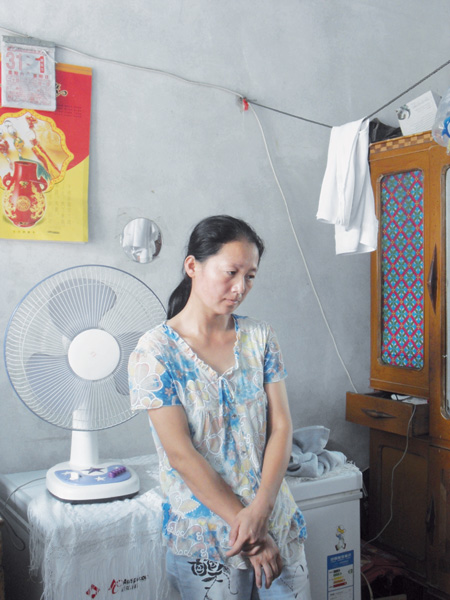Dirty business: To clean up the oil
|
|
|
Liang Shuangying, wife of Cui Zhanyou. |
Richard Steiner, a professor of marine protection at the University of Alaska, who was in Dalian for oil spill research, said, "It might have been effective for recovering oil, but it came at a high cost to the safety and health of the cleanup workers.
"Fishermen picking up oil with their bare hands isn't a safe way to recover oil, and chemical dispersants should never be used in shallow water, because this would increase the exposure of shellfish and the seabed to toxic oil," Steiner told the Global Times.
Zhong Yu from Greenpeace said, "Oil contains several poisonous chemicals that can cause cancer. If pregnant women have contacted with these chemicals, their infants may be born with malformations."
Interview requests to the Dalian publicity department were refused. A male official surnamed Sang told the Global Times," It is inconvenient to accept interviews on the spilled oil issues."
Painted black
After a whole morning hunting for Cui, Gao went ashore and went to his fishing boat anchored under the Jinwan Bridge in early August.
It was one of hundreds of oily, black boats anchored side by side under the bridge, with thousands of plastic oil barrels standing there. The humid air mixed with the stinky, acrid smell of oil and the salty, fishy smell of the sea.
"It used to be different from this. It used to be beautiful," Gao said. One thing has puzzled him for a long time. "After all, we all made contributions to the cleanup. Why has no one come to us, even to comfort us?" Gao said.
Aquaculture drying up
While Cui Zhanyou's family was busy looking for him, most of the fishermen in Dalian were worrying about their future livelihoods.
The Golden Pebble Beach area has become one of the biggest seafood farming bases in Dalian. There are more than 50 seafood farms around the beach.
In Longshan village, over 80 percent of villagers are fishermen or seafood farmers. But Zhang Chunshu, 36, who rents about 8,000 square meter of water for sea farming, stopped selling seafood on July 18.
In his one-story house facing the sea, Zhang showed his tally book. Although it wasn't the hot season for seafood between July 12 and 18, Zhang earned nearly 40,000 yuan for his seafood products, such as shellfish, sea urchins, freshwater clams and oysters.
Things changed after the explosion. He collected all his shellfish for sale the second day after the oil spill, but had no customers.
"For a week after the explosion, I did not get one yuan out of my aquaculture," Zhang said. "People believe the fish were polluted and they're unwilling to buy any."
About five years ago, Zhang and his brother-in-law collected over 500,000 yuan to develop their sea farm business. In the past years, they earned at least 300,000 yuan every year.
But this year, Zhang said, at least they might lose 150,000 yuan.
When asked about his plans for future, Zhang sat in a chair, staring into the deep sea, sighed, and replied "Maybe, I'll leave Dalian for other cities for a job to pay the debts." Zhang and his brother-in-law borrowed more than 100,000 yuan from their relatives for the seafood farming several years ago.
Zhang's biggest concern is "not simply no earnings this year. I bet, in at least three or four years, the marine ecosystem of Dalian still won't have recovered."
 0
0 







